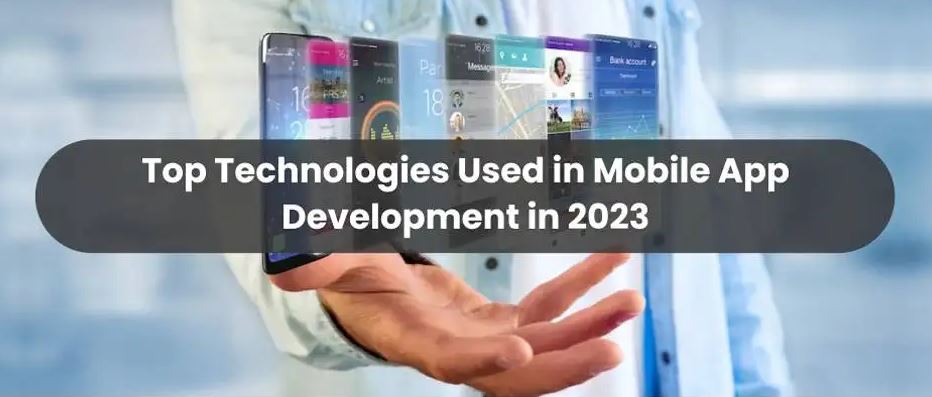
Global mobile app development industry is constantly evolving and simultaneously mobile applications have emerged as an indispensable need of modern business. Companies need to adopt the latest trends in mobile app development if they want to stay competitive and satisfy the needs of their customers. This article discusses about the top 12 technologies that will be used and that will impact the mobile app development industry in 2023.
With more and more people using smartphones and tablets, the mobile applications industry is growing exponentially. In 2022, there were around 6.64 billion people using smartphones throughout the world. Also, mobile consumers are downloading apps at an ever-increasing rate, despite the fact that there are millions already available. Below listed are the top 12 technologies anticipated to be used in mobile app development in 2023.
Top 12 Technologies Trends in Mobile Application Development in 2023
- Artificial Intelligence (AI)
By incorporating AI and machine learning algorithms into applications, several fields have been revolutionised. This includes the advertising industry, customer service, security, and more. Since Apple’s 2017 introduction of Siri integration, there has been a meteoric rise in the popularity and general acceptance of AI-powered solutions. AI helps organisations automate routine operations, extract meaningful information from massive data sets, and provide better services to customers by means of smarter suggestions and more tailored interactions. Further, AI has the ability to spur development in fields like medical diagnosis, driverless cars, and smart homes. This section talks about the uses, advantages, and difficulties of incorporating AI into mobile and online apps.
- Augmented Reality (AR) and Virtual Reality (VR)
The uses for AR and VR technology have expanded beyond gaming and marketing. Current applications include item measuring, indoor navigation, visualisation of interior design, and immersive educational experiences. With augmented reality (AR), digital content is superimposed onto the real world to enrich users’ perception and interaction with it, while virtual reality (VR) offers completely immersive simulated experiences. The immersive and interactive user experiences made possible by these technologies are revolutionizing fields as diverse as architecture, retail, tourism, and education.
- Mobile IoT Apps
Connecting commonplace devices to the web and facilitating effortless data interchange, the IoT has dramatically altered the ways in which we engage with the physical world. The ability to remotely manage and control linked devices, analyze data in real time, and take action is made possible by mobile apps for IoT devices. IoT mobile apps have enabled new levels of automation, efficiency, and convenience across a wide range of industries and applications, from smart homes and wearables to industrial automation and healthcare monitoring.
- Mobile Payments
Mobile payments’ popularity has risen alongside the rise of e-commerce and the prevalence of smartphones. Apple Pay, Google Pay, and PayPal are just a few of the mobile payment applications that provide safe, simple, and frictionless ways to make purchases. These applications let users to link their payment cards or bank accounts, allowing them to make purchases with a simple touch or scan, both online and in shops. Mobile payments have revolutionized business transactions by offering a convenient and time-saving alternative to cash.
- Cloud-Based Mobile Applications
When it comes to building, releasing, and scaling mobile apps, cloud computing has been a game-changer. Mobile apps that store and process data on distant servers provide benefits such as portability between devices, lower maintenance costs, and increased efficiency. Mobile apps may provide more robust user experiences without taxing the device’s limited resources by shifting computing operations to the cloud. In addition to syncing and backing up data, cloud storage also gives users the freedom to view their files from any location.
- 5G Connectivity
With the advent of 5G networks, a brand-new age of mobile connection has begun. 5G paves the way for the incorporation of IoT, AI, AR, and cloud computing into mobile devices by providing quicker speeds, reduced latency, more device connection, and higher bandwidth. Businesses and consumers alike may benefit greatly from this highly developed network infrastructure. 5G connectivity improves mobile app capabilities and user experiences to new levels, from smooth streaming and high-quality video conferencing to immersive AR experiences and real-time data processing.
- Wearable Technology
Wearable devices, such as smartwatches and fitness trackers, have become increasingly popular, driving the demand for wearable apps. These apps offer unique opportunities for businesses to connect with users on a more personal and continuous level. Wearable technology enables monitoring of health and fitness metrics, provides notifications and alerts, and even enables contactless payments. Businesses can leverage wearable apps to deliver personalized experiences, gather valuable user data, and create innovative solutions across industries, including healthcare, fitness, entertainment, and productivity. The seamless integration between wearable devices and mobile apps opens up a world of possibilities for enhanced user engagement and improved quality of life.
- Enhanced Mobile Security
As mobile apps continue to handle sensitive data and facilitate transactions, ensuring robust security measures is paramount. The increasing reliance on mobile devices for various tasks, such as online banking, shopping, and accessing confidential information, demands strong mobile security practices. App developers must implement built-in security features, follow secure coding practices, and leverage technologies like encryption and secure authentication methods. Additionally, the use of blockchain technology can enhance mobile security by providing decentralized and tamper-resistant data storage and transaction validation. By prioritizing mobile security, businesses can establish trust with users, safeguard their sensitive information, and protect against potential cyber threats.
- Cross-Platform Mobile Development
Creating mobile apps that work seamlessly on both Android and iOS platforms has become increasingly important for businesses. Cross-platform mobile development frameworks, such as React Native and Flutter, allow developers to write code once and deploy it across multiple platforms, saving time, effort, and development costs. By adopting a cross-platform approach, businesses can reach a larger audience and ensure a consistent user experience across different devices. This approach also simplifies app maintenance and updates, as changes can be applied to both platforms simultaneously. Cross-platform mobile development empowers businesses to maximize their app’s potential and streamline their development processes.
- Mobile Commerce
Mobile commerce, or m-commerce, has witnessed significant growth with the widespread use of smartphones and the increasing popularity of online shopping. Mobile commerce apps offer a faster and more convenient shopping experience, enabling users to browse, compare, and purchase products on the go. The emergence of digital wallets, such as Apple Pay and Google Pay, has further simplified mobile transactions by securely storing payment information and enabling seamless checkout processes. Mobile commerce apps also leverage personalized recommendations, location-based offers, and push notifications to enhance user engagement and drive conversions. With the continuous advancements in mobile technology and the growing consumer preference for mobile shopping, businesses that embrace mobile commerce can tap into new revenue streams and stay ahead in the digital marketplace.
- Voice Recognition
Voice recognition technology has gained significant popularity as a natural and convenient way for users to interact with mobile apps. Powered by artificial intelligence (AI) and machine learning algorithms, voice assistants have become more advanced and capable of understanding and responding to user commands accurately. Users can perform various tasks, such as sending messages, making calls, setting reminders, and even controlling smart home devices, simply by using their voice. The integration of voice recognition into mobile apps enhances user experience, enabling hands-free and efficient interactions. As the technology continues to improve, voice recognition has the potential to revolutionize how we interact with mobile devices and transform industries ranging from personal assistants to customer service.
- Beacon Technology
Beacon technology, utilizing small wireless transmitters, has emerged as a powerful tool for businesses to engage with their customers in physical locations. Beacons enable targeted marketing campaigns and personalized notifications to app users when they are in close proximity to a specific beacon. By leveraging Bluetooth Low Energy (BLE) technology, these transmitters can transmit signals to smartphones or tablets, triggering relevant content or notifications. For example, a retail store can send customized offers or discounts to nearby app users, enhancing their shopping experience and potentially increasing sales. Additionally, beacons provide valuable insights into user behavior and preferences, allowing businesses to understand customer interactions within their physical spaces better. By utilizing beacon technology, businesses can create more personalized and immersive experiences, drive customer engagement, and gather valuable data for targeted marketing strategies.
Conclusion
Choosing a reliable mobile development partner is crucial for success in this dynamic landscape. Code Creators Inc., with its extensive experience in app development, offers a range of services to cater to diverse client needs. Their team of professional developers stays up-to-date with the latest technologies and ensures the security and quality of the final product.
In conclusion, mobile app development is essential for businesses to thrive in the digital age. By embracing these trends and partnering with a trusted development company like Code Creators Inc.; businesses can deliver innovative, user-centric mobile solutions that drive growth and customer satisfaction. Code Creators Inc. is a SharePoint app development company in the USA and Canada which is dealing with Power BI development, SharePoint Online, Office 365 development, Microsoft Teams, IT services, and more.

